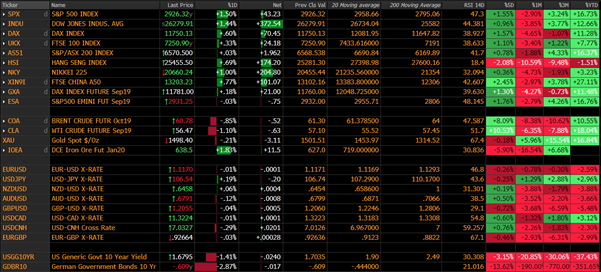After painting a pretty dour overview of the world in yesterday’s write-up, it seems the combination of a world that is incredibly long of gold, JPY, CHF and bonds, married with Trump offering even the slightest belief of convergence with China, has resulted in swift part position-adjustment. The fact we are hearing China sticking to the September trade talks after Trump's move on tariffs should limit pullbacks in risk assets, but the belief to any lasting solution is still met with incredible scepticism.

In fact, the growing view is that for a real solution to play out, that doesn't involve a Democrat victory in the 2020 US presidential election, we will need to see a lot more pain in financial markets that cant be offset by central banks, to really drive China and the US to form a deal. We are not there yet.
Those trading the period at the start of US trade would have seen and felt the moves first-hand. And, it’s for this very reason why many take a broad assessment on positioning, risk reversals (sentiment) and technicals. As this holistic approach offers insight into our risk, and from here, we trade price and react accordingly.
A staggered approach to tariffs
The idea that Trump can stagger the 10% tariffs into two tranches, with $130b tariffs kicking in on 1 September and the balance on 15 December, has been framed as a relief for American consumers ahead of Christmas. But if we take this move isolation, the end result will unlikely be any different, and this tax will likely act as a headwind to US and Chinese growth by some 30bp and 50bp respectively. That does not change, although if you think markets are driven on sentiment and psychology, the fact we have not seen anything but bad news of late, shows the impact of even the smallest sign of convergence, without any immediately apparent concession from China, has been enough to provide a relief rally.
The fact we have seen the PBoC ‘fix’ the mid-point on USD/CNY today at 7.0312 and lower than markets model of 7.041 - the fifth consecutive day in a row the PBoC could have depreciated the yuan by less than expectations, has been a stabilising factor for markets. There is little doubt the PBoC could have really accelerated rush to preserve capital and increased market volatility.
Selling strength in equities
However, a ‘relief rally’ is all I sense here, and a position adjustment, notably in some very loved assets. In fact, the idea that if we marry this tariff news with a slightly hotter US CPI print, with headline running at 1.8% and core CPI 2.2%, and we get a market that has mostly priced out a 50bp cut in September, and that on any other day could have be seen as bad for risk assets. The probability of a 50bp cut from the Fed at the September meeting now sits at 15%, so, a strong print in tomorrows US retail sales report (22:30aest), with consensus calling for 0.3%, and rates pricing will head to just one cut, while the 90bp of cuts priced over the coming 12 months will come into question.
If we look at the set-up on the S&P 500, we’ve seen sellers into the 61.8% retracement of the July to August sell-off, ahead of horizontal resistance at 2958. In fact, S&P 500 futures are starting to attract sellers, and maybe that’s a sense that the US session rally was overdone, or perhaps it’s the fact that today’s Chinese data was so poor, with July industrial production coming in at 4.8% (consensus at 6%), and the lowest levels since 2002. Retail sales printed 7.6% growth and a full percentage point below expectations. Chinese equities seem unperturbed, although, we have been seeing buyers in USD/CNH, and this will just ramp up calls for liquidity to stay accommodative.
A quick review of Asia trade
So, while higher, Asian equity markets have come off their highs and we see a renewed bid in the JPY, resulting in a whippy session in USD/JPY, while US 2-year Treasury’s are 3bp lower at 1.63% through the session. US crude is 1.2% lower, although this move lower has been most heavily influenced by a 3.7m drawer in the API inventory report, with traders extrapolating how this feeds into tonight’s more official Department of Energy (DoE) crude inventory report (due at 00:30 AEST), with the consensus currently estimating a draw of 2.19m barrels.

For those close to crude, it won’t have gone unnoticed that the US oil rig count (see chart below) has fallen from 888 rigs in November to stand at 764 rigs. If you want to know a clear area where business investment is falling, we look to energy. Lower oil prices are not good for economics.
The AUD is holding in quite well, trading towards the top of its session range of 0.6809 to 0.6778, despite the weakness we have seen in CNH (yuan traded in HK), with some focus on the local data with the August Westpac consumer confidence increasing 3.6% and Q2 wages growing 0.6% QoQ (VS 0.5% consensus). There has certainly been a muted impact in Aussie bonds, with the 3-year Treasury +3bp at 68bp, while the implied chance of a September cut has fallen to 43%.
Economic data aside, it’s been all eyes on the news flow out of Hong Kong, and the situation remains fluid and concerning. The Hang Seng failed to close Monday's gap (at 25,824) and has gone into the lunchtime close +0.5%, but 1.2% off its opening high. With the market on edge to see if we do get a formal military response from the PLA, and how this plays out, it shouldn’t surprise that traders are selling strength in the Hang Seng.
